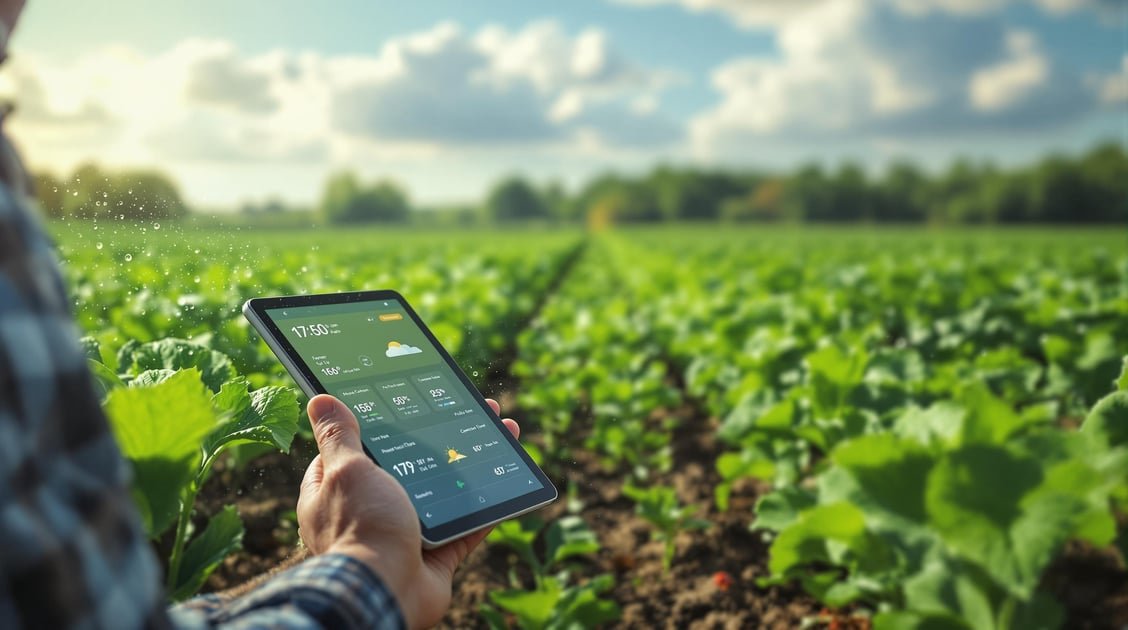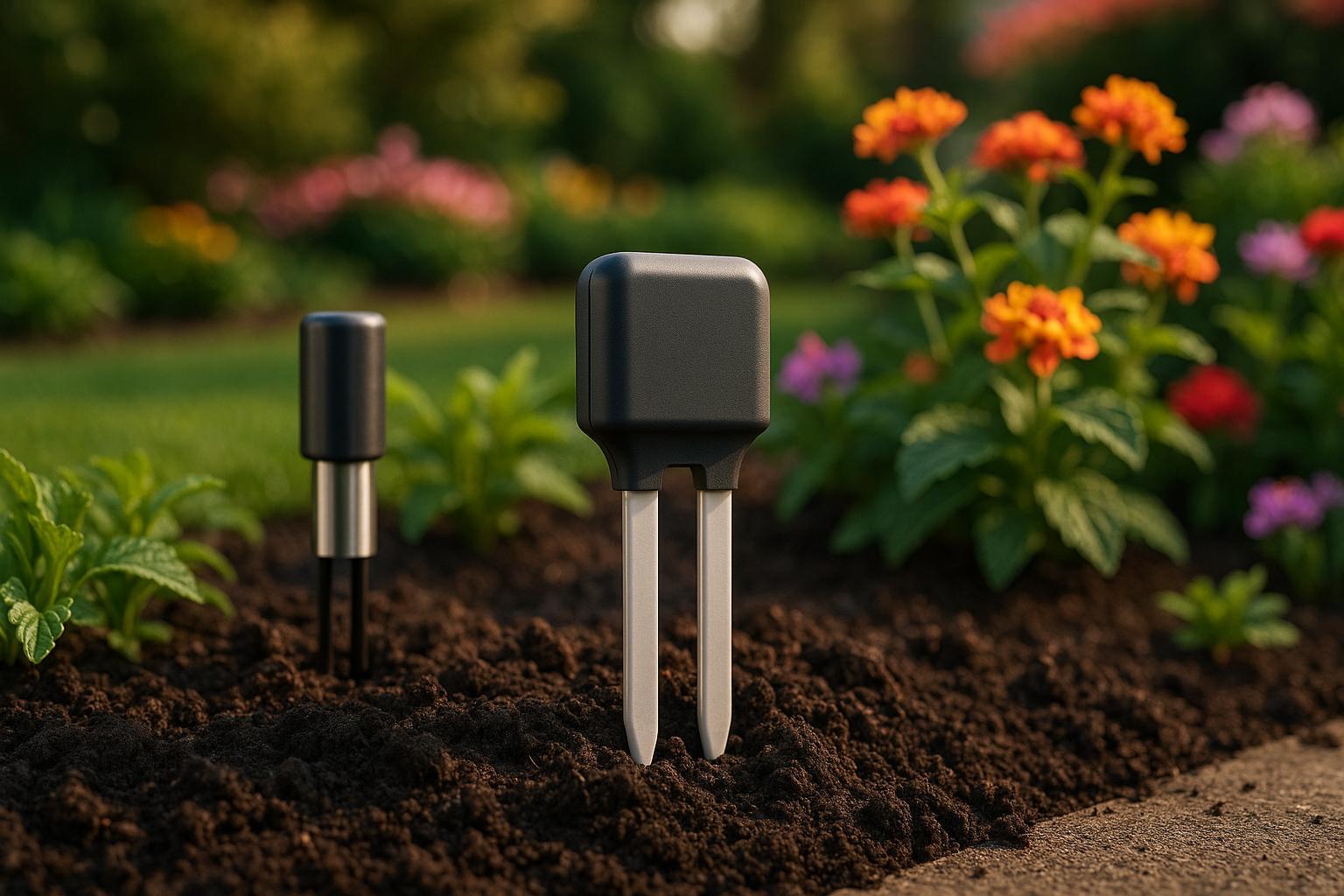How AI Improves Weather-Based Irrigation

AI-powered irrigation systems save water, reduce costs, and improve plant health by using real-time weather data and soil conditions to adjust watering schedules automatically. They analyze past weather patterns, predict optimal watering times, and tailor irrigation to specific plant needs. Here’s how they help:
- Water Savings: AI ensures water is used only when and where needed, cutting waste.
- Healthier Plants: Consistent moisture levels promote better growth and prevent overwatering.
- Cost Efficiency: Automation reduces labor and maintenance expenses.
These systems are used in home gardens, large landscapes, and farming, offering precise water management for diverse needs. With advancements in sensors and smarter weather predictions, AI irrigation continues to adapt to changing climate challenges.
Main Benefits of AI Irrigation
Water Savings
AI-powered irrigation systems help conserve water by adjusting watering schedules based on real-time weather data, soil moisture levels at different depths, and the specific needs of plants. By aligning water usage with weather patterns and seasonal changes, these systems deliver water exactly when and where it's needed, leading to noticeable reductions in water use.
Improved Plant Growth
With consistent moisture control, AI systems create the ideal conditions for plants to thrive. They promote better root development, healthier growth, and reduce problems caused by overwatering or uneven moisture levels. The result? Plants that are healthier, stronger, and grow more uniformly.
Reduced Operating Costs
The automation and predictive capabilities of AI irrigation systems go beyond saving water. They cut down on manual labor, prevent overwatering, and reduce the chances of system breakdowns. This means lower costs for maintenance, labor, and replacing plants, making operations more efficient and cost-effective.
AI Irrigation System Components
Weather and Soil Monitoring
AI irrigation systems rely on a network of sensors to guide their decisions. These sensors combine soil moisture levels with weather data, including temperature, humidity, wind, rainfall, and solar radiation. This combination allows for precise irrigation tailored to the current conditions.
Automatic Schedule Updates
With real-time data from the sensors, these systems adjust watering schedules automatically. They factor in soil type, specific plant requirements, and weather forecasts to determine the best times and amounts for irrigation. For instance, if soil moisture drops below the desired level, the system activates watering without manual intervention.
Weather Pattern Analysis
In addition to real-time adjustments, AI uses historical weather data to refine future irrigation plans. By analyzing past trends alongside current forecasts, the system predicts needs more accurately. For example, if summer afternoons often bring thunderstorms, it may schedule watering for the morning. This approach helps maintain consistent soil moisture and promotes better plant health.
Current Uses and Results
Home Gardens
AI-powered irrigation systems are transforming home gardening by combining real-time weather forecasts with soil moisture data. These systems automatically adjust watering schedules for different areas of a garden - whether it’s a sunny vegetable patch or a shaded flower bed - ensuring each zone gets the right amount of water. Tools like AIGardenPlanner go a step further by helping homeowners design appealing landscapes and choose plants that match their local climate and watering needs.
Large Landscapes
For larger outdoor spaces like commercial properties or public parks, AI irrigation systems provide efficient water management. They use weather updates and sensor data to deliver the right amount of water to areas with varying sunlight, soil, and terrain conditions. This smarter approach helps maintain lush landscapes while promoting better water conservation practices across wide green spaces.
Farming Systems
In agriculture, AI-driven irrigation systems fine-tune watering schedules by analyzing weather patterns and soil conditions. This ensures water is used efficiently and crops stay healthy, even during periods of inconsistent rainfall. Farmers benefit from improved crop yields and more efficient water use, making these systems a crucial tool for modern, sustainable farming. These advancements also open doors for further progress in AI-based agricultural solutions.
sbb-itb-4d6a8dd
🚀 Ready to Reinvent Your Garden?
Join thousands of homeowners who have transformed their gardens using our AI design tool. Upload one photo to explore endless possibilities.
Get your AI garden designs →Next Steps in AI Irrigation
Expanding Sensor Capabilities
New sensor technologies are set to go beyond traditional soil moisture measurements, offering a broader range of data for weather-based irrigation systems. While current systems primarily focus on moisture levels, upcoming sensors will include metrics like air quality and nutrient content, providing more detailed insights for irrigation strategies. For example, AIGardenPlanner already uses AI-driven analytics to provide personalized gardening advice based on local weather and soil data. These advancements pave the way for managing larger areas with greater precision.
Managing Large Areas with AI
AI-powered irrigation systems are being developed to handle extensive properties more effectively. By linking controllers, sensors, and weather stations, these systems can create irrigation zones tailored to specific conditions in different areas. This networked approach enhances water distribution by adjusting it to localized needs, making it ideal for municipal parks, commercial landscapes, and large-scale farms. Such systems are designed to optimize water use across diverse terrains, boosting efficiency and reducing waste.
Smarter Weather Predictions
With more sophisticated data inputs and zone management, AI is improving how irrigation systems understand and predict weather patterns. Advanced algorithms now analyze historical weather data, satellite images, and local measurements to adjust watering schedules proactively. This capability helps irrigation systems respond to shifting weather conditions, ensuring water is used efficiently while conserving resources - especially critical as climate patterns grow less predictable.
AI Smart Irrigation Systems: Conserving Water with AI

Conclusion
AI-powered irrigation systems provide precise, data-based water management for gardens and landscapes. By using weather forecasts and local climate information, these tools help conserve water and support healthier plants.
As technology advances, these systems are becoming more accessible to both homeowners and professionals. This progress is making it easier to incorporate smart solutions into garden planning and maintenance.
For example, platforms like AIGardenPlanner offer tools to simplify garden design. Features include AI-generated plant recommendations, growing tips, and maintenance schedules. The platform also helps users create irrigation strategies tailored to their specific local conditions.
With unpredictable climate patterns becoming more common, AI-driven weather insights and automated watering systems are essential for managing gardens efficiently. This approach ensures water is used effectively while adapting to shifting environmental challenges.
Related posts
Related Articles

How AI Updates Garden Designs for Each Season
AI tools transform garden design by providing tailored planting advice and seasonal care tips, ensuring vibrant gardens year-round.

Small Garden Design: 10 Tips to Maximize Limited Space
Transform your small garden into a functional, inviting space with tips on vertical gardening, space-saving furniture, and strategic plant choices.

Ultimate Guide to Planting Peppers in Raised Beds
Discover the benefits of planting peppers in raised beds and expert tips for successful pepper harvest. Learn about improved drainage, soil quality, weed control, and more!

Niwaki Pruning for Minimalist Gardens
Learn the art of niwaki pruning to create stunning minimalist gardens with sculptural trees that enhance tranquility and balance in outdoor spaces.

Ultimate Guide to Durable Sensor Materials for Gardens
Explore durable sensor materials for gardens that enhance performance, save costs, and improve water management for thriving plants.

10 Minimalist Garden Ideas for Small Urban Spaces
Transform small urban spaces into tranquil retreats with minimalist garden ideas that emphasize simplicity and smart design choices.